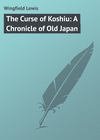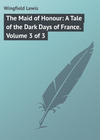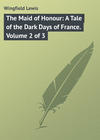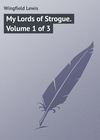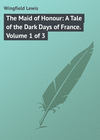Read the book: «My Lords of Strogue. Volume 3 of 3», page 3
Her first question somewhat disconcerted the amorous giant.
'How is Terence?' she asked, recovering her usual calm.
He glanced suspiciously down, but there was no tremulousness about the serene face such as his own coming had provoked. It was natural to ask after a cousin who was once a playfellow, and was now on the threshold of an ignominious death.
''Deed, and he's bad, acushla!' he returned bluntly; then, with an affectionate hand-squeeze, followed beckoning Shane to pay his respects to my lady.
With heartfelt thankfulness the girl, who went with them, listened to Shane's budget of gossip, as he tumbled it out, a confused medley, for his mother's benefit. This French expedition was but the wild freak of an adventurer unwisely brave. He and all his men-Frenchmen all-were gone in chains to Dublin, a mirth-provoking spectacle for the good townspeople, who were getting weary of badgered Croppies. The boys at Letterkenny were coming to his little fête-he was to send the yacht and a whole fleet of boats for them. It would be rare fun!
By-the-bye, Sir Borlase Warren and some English ships of war were cruising somewhere close by-their mission to prevent another French band from landing, if another leader should be found as foolhardy as this Humbert. That was not likely. Sir Borlase would have his cruise for nothing. The laws of hospitality demanded that he should be entertained. Shane had left a message at the tower on Fanad Head to the effect that Lord Glandore would be glad to be civil to Sir Borlase. Maybe he and his officers would grace the prospective fête. With this Shane descended to the cellar, to look out some bottles of prime claret for the delectation of Cassidy. Being but a half-mounted, my lord had consistently treated that personage at Strogue with indulgent patronage mingled with hauteur; but now he was so tired of getting drunk alone, or with the rough skipper of his yacht, that he condescended to kill a fatted calf for the behoof of the new arrival.
So the third French expedition had gone off like a damp squib! Doreen was in nowise sorry for the prisoners. Faithless as the French had been, great in promises which were never fulfilled, it served them right to be punished for their folly. But she was deeply thankful that Tone was not among them. It rather surprised her, till she reflected that her young hero was wise beyond his years, and far-sighted too. He saw, no doubt, as she did, that the moment was come and gone; that there was nothing for it but endurance now. He was galloping in his general's uniform on the banks of the Rhine, or perchance was one of Buonaparte's staff in Egypt or elsewhere. He had slaved with the power of a young Samson for motherland; but treachery had done her work-Samson was shorn. He could do no more. Like her, he could only wait. It was a mercy that his life was spared.
Cassidy's presence was certainly a relief to all, by introducing a new element of interest into a household devoured by ennui. He was so gay and willing. It was a pleasure to hear his rich voice carolling one of the dreamy songs of Ireland, as he caught fish for breakfast over the garden parapet. Even my lady had a wintry smile for him. Shane dragged him out with glee to look at the Martello towers, to shoot a seal, to have a blaze at the puffins about Malin Head. The cheery, pleasant creature! Sir Borlase and his fleet sailed by. The admiral's boat, manned by its natty crew in dazzling white garments, shot to the staircase hewn from the living rock, to scrape acquaintance with the hermits of Glas-aitch-é. He thought he had never seen so singular a household. The scared aristocratic-looking lady, with snowy locks and deep furrows of sorrow ploughed on her faded cheeks-each line in the fretwork of whose brow told of carking care, each rustle of whose silken robe spoke of overweening pride; the beautiful tall gipsy, with pride as great as hers, which was tempered by a serene sadness that became her beauty well. And dwelling with this pair of cold, haughty women, two men of such a different stamp! The young lord, a reckless devil evidently, and fierce, despite his somewhat effeminate figure and tiny hands; given, too, to the modish vice, as was evidenced by the coarsening of his fine features. And then, culminating surprise, the great jolly giant-type of a rollicking Pat-vulgar and humorous; who somehow was of much commoner clay than his three companions, who yet treated him with indulgent friendliness. What a strange life this quartet must be leading? the admiral mused, as he went upon his way. They would repay careful study. He had no particular orders as to his cruise, except that he was to watch the northern coast. He would inspect the inlets of Lough Foyle, and then come back again. Why were they leading this odd hermit life? Decidedly it would be worth while to examine them more closely. The maiden and the giant went about together a good deal, he remarked, in two frail coracles, side by side-paddling among banks of heavy seaweed, landing on the strand to visit cottagers, skirting the beetling cliff in search of rare ferns and lichens. Could they be about to make a match of it? Some of the most happy couples are composed of the most conflicting elements. Yet it did seem a pity for a refined girl like this to unite herself to a common farmer-fellow!
My lady, too, remarked the apparent flirtation, and frowned. 'What's bred in the bone will come out,' she muttered, as, sitting on the marble seat among the straggling flowers, she basked in the sun. 'It's the blood of her mother. She has a predilection for common people. That is why she went on so shamefully at Strogue, consorting with the sons of old Doctor Emmett, who, in his way, was a good man, in preference to cousin Shane!' Then, remembering the behaviour of her second son, she contemplated her ghost again. 'That he should come to a shameful end,' she groaned, wringing her hands together. 'Is this a direct judgment on me? Did my husband foresee this when he spoke upon his death-bed? Had I acted as I ought, would Terence have been saved?'
Doreen was so accustomed to be led by her wayward will that it did not strike her that she was doing anything peculiar in going thus about with Cassidy. She occupied her boat, he his; sure, nothing could be more proper. She had always looked upon him as on a Newfoundland dog, whose rough gambols are amusing, and courted his society now to hear details of her Dublin friends without interruption from her aunt. She learned much that was true and much that was false. With grief she listened to the weary tale of treachery, marvelling with Cassidy as to who the traitor was. She burned with indignation at the conduct of the executive, observing that there is an unwritten law in accordance with which the ignorant are to be protected from themselves; not coaxed to crime and then murdered for it. For some reason of his own, the giant avoided the mention of Terence; and Doreen respected his delicacy, for she thought that perchance he had ill things to tell of him, and she shrank from hearing them; clinging rather to her present state of doubt.
One day as they drifted on the glassy sea-the one pensive, with her chin upon her hands, the other distracted by his increasing passion-Cassidy remarked that her coracle was leaking, that a tiny rift had been cut in the side by a jagged stone, and that the water was lapping in unawares. He swore there was peril-lost his head in an absurd manner-while she smiled. Why did she not choose to come out with him in a bigger boat? These frail cockle-shells were ridiculous! What greater delight could there be for him than to row so precious a burthen?
'I prefer my liberty,' was her demure reply, as she measured her distance to the islet, and then the incoming water. 'If I put my strength into it I shall get safely home, so don't excite yourself.'
With rare skill she plied the light oars, baring her shapely arms and stretching them to their full length, and arrived at the staircase-foot out of breath, but safe, ere the coracle had time to fill.
'There!' she said in smiling triumph, as she stood on the slippery step, her ripe lips half opened, her bosom heaving. 'Am I not quite fit for the rôle of an old maid? Can I not look after myself without a protector?'
Cassidy, with emotion, was as breathless as she. 'Like the poor Irish boys,' he blurted out, 'you should be protected against yourself. When you are my wife you shan't play such pranks!'
Doreen, who was moving up the steps, turned swiftly and looked down at him. There was pained wonder in her tawny eyes-scornful anger in the knitted arches of her brow.
'Mr. Cassidy!' she said, panting. 'Oh, I'm so sorry! Is this my fault? I thought it was quite understood that your former nonsense was mere passing fancy. Never, never speak like that again, or I must tell my aunt, who will turn you out of doors. Indeed, after this, I'm very, very sorry, but the sooner you go away the better!'
Her face was crimson. Gathering up her skirts, and thereby displaying a silver buckled brogue and ribbed woollen stocking, she tripped lightly up the flight and was gone, leaving her forlorn admirer to see to the boats alone.
Was it for good or ill that she went away so hurriedly? Would it have been better for her to have beheld the true man without his mask? She could scarcely be more pained and astonished than she was already. She was not intentionally a coquette. The manner of her bringing up and the atmosphere of melancholy by which she was enwrapped, caused her to think it possible to be on platonic terms with men upon a purely brotherly basis. Neither Tone nor the Emmetts had dreamed of making love to her. She did not consider her own beauty and the inflammable nature of the Hibernian heart-that is, when it is not fully engrossed already by national grievances. Perhaps she would look on Cassidy as he really was ere long-most probably indeed-for as he bent down to tie the boats, the water reflected a villainous expression of countenance, whilst he swore under his breath to be revenged for having been tricked and fooled by a born jilt.
CHAPTER III.
SHANE'S LITTLE PARTY
When she observed a marked coolness 'twixt Doreen and the guest, my lady frowned more and more. Amantium, iræ! This was worse and worse. Was this boor to take the damsel from under Shane's nose? It occurred to her that it was time to shake off her lethargy. Ghost or no ghost, it would not do for this 'half-mounted gentleman' to carry off the prize after which she had stooped for years to scheme herself, for reasons of her own. As it seemed slipping from her fingers, it appeared to grow in value; and the importance of the danger exorcised the ghost for the time being. Shane's interests should not be made to suffer through his mother's indifference. The list of charges against the hapless dowager was full enough without that. So soon as the fête to the squireens was over, she would return to Strogue. Why did she ever leave it to come to this accursed spot? She became once more the imperial countess-roused herself-went hither and thither to see that the family name was not dishonoured by the preparations for hospitality-suggested changes for the better-had the garden roofed in with curtains, and tables spread there in cool shadow. It would be nice, she affirmed, for the gentlemen to enjoy the unrivalled panorama of the Donegal mountains whilst sipping the equally unrivalled claret of their host.
Doreen, who on reflection was grievously annoyed anent the folly of her large admirer, was taken by surprise when she beheld this new phase in her aunt's demeanour. She was a kaleidoscope, but certainly not mad. No judge on the bench was more sane than she. The corroding gloom was still there, but lightened; no longer engrossing its victim as it had done. Power had been given by some mysterious agency to shake off the weight. Who might solve the riddle? Was the cause of her agony actually gone? It could not be remorse, then. The gloom which remained was exhaustion after pain. Doreen gave it up, and resigned herself to the consideration of tarts and puddings for the benefit of chawbacons.
The grand day came, and with it the squireens, who were turned to stone by the aspect of my lady, as by a gorgon's head. Despite the chill which hangs over the sea at sunrise, their warm hands became more and more clammy in Medusa's awful presence. She wore a stiff brocade cut in an obsolete fashion, with a broad sash and full white fichu loosely knotted behind. As a gorgon she was a success. Never in the palmy days of Dublin Castle had she struck terror into the bosoms of débutantes as she did now into the innermost souls of these raw youths. They mopped their brows, rubbed their moist hand-palms on their small clothes of kerseymere, tugged at their tight vests, felt nervously whether their pigtails were hanging straight over the tall coat-collars which sawed their ears, stumbled over their swords, demeaned themselves after the manner of awkward youth when in a paroxysm of timidity. She curtseyed like Queen Elizabeth, with high nose exalted, and they shrank back in a wave affrighted; only to ebb again in renewed fear, having well-nigh knocked down the lovely Miss Wolfe who was making a dignified entrance by another door. Those two haughty women together in one room were quite too much for them. With relief they sat down to a sort of improvised breakfast, for the shadow of tables would conceal their shoes, the country make of which had already been remarked by the younger lady's eagle eye. Conscience makes fools of us. Doreen cared not about their shoes, nor saw them. She merely thought the young men a set of oafs, and was displeased, in that they should have arrived too early. By prearranged programme they were to be taken to inspect the towers; then to view the English fleet, by kind permission of Sir Borlase; then they were to return to dinner, to get as intoxicated as if they were 'gentlemen to the backbone,' sleep off their orgy, and return in the morning to Letterkenny barracks. An excellent programme, no doubt, wherewith to while away an autumn holiday-but a still better one had been prepared for them by destiny.
While the party was at breakfast, the stillness became broken by an odd concussion in the air. A dull series of unequal thuds a long way off, which reverberated on the waves, that seemed to bear them onward in muffled throbs. What could cause the strange sensation which acted on the nerves with such irritating effect? It was not thunder. Nobody present had ever been in battle, or they would have recognised the singular sound, which is indescribable, and which, having once been heard, may never be forgotten. It was part of the programme that they should be shown a fleet. Fortune was lavish, and decided to show them two. The English fleet was in the offing; so was the French. At dawn, Sir Borlase (whose squadron amounted to nine vessels) had been no little taken aback by the appearance of four ships hurrying through the mist. On descrying the glint of his white sails these ships tacked and made off, confessing by the movement, though they showed no colours, that they represented an enemy. He instantly gave orders to stow away the holiday gear and clear for action-despatching a message to my Lord Glandore, to announce that he was gone away on business, but that he might return in time for dinner, and bring some extra guests with him.
The French! How silly was the Grande Nation! When energy and promptitude might have lost Ireland to England, they hung about and dawdled and did nothing. When the critical time was passed, they seemed suddenly to have awakened and to be resolved to rush wilfully by driblets into the open jaws of death. When Humbert landed a few days before, he had at least the advantage of surprise. Warned by his bit of lunacy, English squadrons were despatched all round the seaboard to guard the coast; and yet a handful of adventurers could still be found to attempt to seize a country that wanted them no more!
When the admiral's message came, Cassidy glanced sideways at Doreen. She turned pale, and, to the relief of the squireens, retired indoors.
The opening of Lough Swilly is one of the most perilous points for seamen who are ignorant of its peculiarities, even on an iron-bound coast which everywhere is dangerous. At ebb there are long stretches of low water, broken here and there into surf by banks of underlying rock. When the French ships strove to flee before Sir Borlase (there were only four-the rest of the expedition being, as usual, nowhere), the French commander recognised the fact that, being caught in a trap, he must stand at bay with one to ensure the escape of the other three. He had one big and heavy man-of-war which floundered-badly piloted-like an unwieldy whale, nearer and nearer to the cliff. The English admiral was bearing down on him. There was no time to tranship men-to leave the monster to its fate-empty-an idle prey. With intrepid courage he signalled his other ships to retreat through shallow water, resolved alone to honour his country's flag, which was now unfurled, by a desperate but hopeless defence.
Sir Borlase despatched a razee and a frigate after the fugitives. They flitted into distance, and were seen no more. Then, the black monster having been surrounded by five smaller foes, one of the most obstinate engagements began that was ever fought upon the ocean. The occupants of the island could mark all that passed, for the returning tide drifted the helpless hulk closer and more close inland, and they, as it were, occupied a front place at the entrance of the lough wherefrom to view the spectacle. It was most exciting. Even my lady's dulled eyes sparkled as they had not done for years. Shane-almost delirious-the cicatrice on his forehead standing forth like a stain-whooped and hallooed and clapped his hands and danced fandangoes on the parapet, and would have tumbled headlong over the garden wall into the sea, if the giant had not held his skirts. Who should be a better judge of such matters than the King of Cherokees? The squireens forgot their nervousness, became oblivious of country shoes, of ill-made pigtails, and red ears and knuckles, whooping and hallooing like a pack of hounds, in echo to the whooping of their host. Some (but these were very forward) even clutched Medusa's dress-pinched Queen Bess's arm-in their eagerness that the white-haired lady should not lose a point in the struggle.
For six hours the doomed monster laboured, heaving on the shallow waves, drifting within a stone's throw of Malin Head. Figures could be detected through the smoke, scurrying hither and thither in blue uniforms, with gestures of command or encouragement. Two, more busy than the rest, were on the poop, rushing forward-aft-conspicuous in the front of peril for gold-laced sleeves, huge hats and feathers, loose hair after the French mode. Masts and rigging crashed and crumbled-the ponderous hull winced and swayed with repeated shocks, while the surge lapped creamy round its prow. The roar of artillery now was deafening.
'If they don't take care,' Shane screamed, as though his warning could be heard, 'that blundering hull will jam the little vessels against the rocks!'
With a desperate energy which compelled the sympathy even of the squireens, the doomed ship returned fire for fire, though her sails and cordage clung about her in ribbons; though her shattered ribs yawned at each new stroke; though her scuppers flowed with blood; though her decks were piled with corpses. As the smoke swirled away in eddies, the two in hats and plumes could still be seen exposing themselves recklessly, ordering up hammocks and spare sails to stuff into widening gaps. The cannonade of Sir Borlase rang among the sea-caves, bringing thence whirring troops of bats, which dashed in their terror in the faces of the combatants, then dropped dazed into the sucking swell. The frightened fisher-folk looked on furtively at first from holes and clefts, then fled inland, leaving their precious nets and boats as a spoil for the spoiler. The death-struggle of the monster was painful to look upon, as it swung heavily and shivered whilst blow succeeded blow. It was a gallant monster, for the tattered tricolour still dangled over the gap where once the rudder was-a valiant monster! Enemy though he might be who was receiving a final battering, few could look without pity on his death-throes-for he was dying game.
Gurgling foam-whipped water began to pour into the hold of the big ship, which now lay so close at hand that her name was visible in florid carving on her poop-Hoche. The name of Tone's friend and Buonaparte's rival, who had died but a few months ago, of consumption, on the Rhine. She was a dismantled wreck-nothing but a dark battered hull. Her batteries were dumb; dismounted. The tattered tricolour went down, as a signal that she struck. The banging of Sir Borlase ceased. The sudden stillness, after so long-drawn a hubbub, was painful to the ear. The squireens clasped each other's hands and embraced in their excitement, whilst Shane drew forth his jewelled timepiece.
'By the Hokey! but it's a glorious sight!' he gasped, flapping his face with a dainty handkerchief; for a spectacle such as this touched the finest chord in his nature. 'Six hours, as I live; and it seems scarce six minutes. The sun is high in the heavens, though you can't see him for the smoke, save as a saffron disk. They are fine fellows, mounseers though they be; we'll give them a hearty cheer when Sir Borlase brings them to dinner. On my honour, I half wish they had conquered!'
Doreen, at the commencement of the action, had withdrawn alone to the watch-tower where the fire-bucket stood, and remained there clutching it with a heavy dread. What a relief it had been to her mind to think that the French had given up all thoughts of invasion! Something told her that that big rolling hulk, caught in shallow water as an unwieldy fish may be, was the flagship. Who might there be on board? When the roaring ended and silence supervened, she was still at her post of vantage, concealed from the sight of the excited mob below by the rolling masses of vapour, which hung like winding-sheets upon the sea. She stood there as in a trance-motionless in the body, though her mind worked with exceeding swiftness-till, after a lapse of time, the sound of measured oars made itself audible, approaching gradually, with regular plodding rhythm; and then a row of boats, headed by the admiral's, loomed at the stone staircase-foot. She woke with a shudder to a Babel of shouts and laughter, and slowly descended from her eyrie, trembling with mortal apprehension.
'Mounseers, every man Jack!' Sir Borlase was saying, cheerily.
'Thank God!' was the fervent echo in Doreen's bosom.
'The French-Irish boys are conspicuous for their absence when it comes to blows for Ireland,' went on the admiral. 'Quite right, too; for we couldn't treat 'em as prisoners of war, you know. There's not a man among my prisoners, thank the Lord, who's not a Parleyvoo.'
Doreen appeared in the small battlemented garden, but stood aside, out of respect to the vanquished braves. They passed her by in their blue full-skirted coats and voluminous neckcloths and queer cocked hats and plumes; some bleeding, some reeling like drunken men, some with heads bowed and livid faces, some with a poor assumption of jauntiness-all smirched and powder-blackened.
They passed between two scarlet hedges, along the avenue which the squireens opened for them, into the low entrance-hall, and there waited in knots. There could not be the smallest chance of escape; therefore no guard was set. Generous Sir Borlase was sorry for the men who had fought so well. This little courtesy was due to such brave soldiers. They might wander where they listed on the islet, while the British admiral was arranging what was to be done with them.
Lord Glandore busied him exceedingly; held important conferences with Sir Borlase and the commandant of the squireens. If the poor fellows were to be captured at all, it was a stroke of luck for him that they should have been taken within his jurisdiction. They should be packed off, by-and-by, in his own yacht to Rathmullen; he would go himself with the escort. The commandant at Letterkenny would send them on to Dublin; he, too, would ride thither. It would be wonderful if he did not receive an English marquisate as reward for his brilliant services. Meanwhile it behoved him to play Grand Seigneur. If there was one thing which could create a passing spirit of real generosity in his shallow nature, it was the sight of personal prowess. He always loved a good duel, a good cock-fight, a successful bear-baiting. Had he not been in the habit of fighting endless duels himself for a mere bubble reputation? His own rapier was rusty now from want of use; but, please the pigs, he would start afresh next week in the metropolis, and resume his crown and sceptre as King of Cherokees. This contest on the sea had been a delightful affair; the vanquished should quaff their fill of his very best claret-aye, the very primest. As he descended to the cellar he beheld Doreen doing woman's work. She was a kind creature, though stuck-up. She had summoned the maids with linen and water. They were moving quietly among the groups, whilst she, with high-bred courtesy, was whispering gentle words of consolation.
There, in a remote corner, sat the two who had behaved so gallantly. Their fine scarlet capes and cuffs, and gold-bedizened hats, proclaimed them to be of the highest military rank. One was nursing his knee and whistling softly, as his mind wandered far away; the other was bent forward; his hands were clasped over his face; hot tears were trickling between his fingers.
'Be of good cheer,' the lively first one murmured; 'we shall see la belle France again, no fear. We shall be ransomed by-and-by. You will again behold your wife and little ones.'
Doreen swept with stately grace to where they sat.
'Are either of the gentlemen hurt?' she inquired in French.
He who was bowed down looked up. She dropped the pitcher which she held, and staggered against the wall.
'Theobald-here!' she whispered.
Alas! Yes. It was Theobald Wolfe Tone-thinner, paler, with all the youth gone out of him.
'It was not thus that I had expected to return,' he said in French, with a sorry smile. 'Yet what matters it? Le temps et le malheur ont flêtri mon âme!'
Doreen speedily recovered her self-possession.
'How culpably rash!' she muttered. 'There is no one that knows you in this place who would betray you; you will pass for a Frenchman. I will warn Shane, that he may not show surprise. That you should have come at last! Too late-too late!'
My lady, who was always the first to think of etiquette, suggested that the officers of high rank should occupy the reception-rooms. It was showing scant civility to leave them in the hall, like lacqueys. By-and-by, when the repast was served, they should be shown by their hostess, in person, to the places of honour.
Miss Wolfe gladly echoed her aunt's suggestion, for she was burning to talk to Theobald, yet dared not in this public place, under the eyes of awestricken oafs.
'Mademoiselle's goodness almost makes us thank defeat,' observed Tone's companion, with a Parisian bow. 'If all the ladies in Ireland are like her, it will be a sad moment for us when we come to be exchanged. As for our melancholy friend here, he need surely not be recognised. His appearance is worthy of the uniform he wears, his accent will pass muster; he has quite acquired the je ne sais quoi of the Boulevard. We begged of him not to risk himself, but he would; and here he is-que voulez-vous?'
Yes, here he was; there was no doubt of that dreadful fact. In wrath (which the Parisian thought became her style of loveliness) she rated him in whispers for his folly, charging him with flying in the face of Providence, with being selfish and unkind.
Theobald listened, while his eyes wandered over the blue line of mountains, glittering now through rifts of driving smoke in the prismatic haze of a hot afternoon.
'I could not help it,' he said, with slow despondency. 'I knew we could not succeed. The English Government was informed of our starting. It was an attempt to resuscitate a flame quenched beyond power of rekindling. Yet I felt it my duty, if the Directory sent but a corporal's guard, to go and die with them. The hand of the executioner shall never be laid on me. If my time has come, it has come.'
This dejection was terrible to witness. Veering round, after the way of woman, Doreen took his hand in hers, and, stroking it, nestled by his side.
The Parisian felt himself de trop, and, humming a gay air, turned his attention to the landscape. It was a relief to his sense of les convenances when a fourth person entered the drawing-room.
It was Cassidy, whose face underwent a series of rapid changes as he recognised his brother-in-law. He had ceased to be the jovial, jolly, willing Cassidy. There had been a spiteful peevishness about him for days past, which surprised Miss Wolfe no little. The milk of his good-humour had turned sour. She thought it singular that her refusal to become his wife could alter a man's nature so.
'You!' was all that the giant could find breath to say, as with fists thrust deep into his breeches-pockets and thick legs straddled wide, he stared at the apparition.
Theobald held out his hand, but he whose sister he had married did not take it. His mind was seething with new ideas. What an unexpected way had now presented itself of, at one stroke, making his fortune and revenging himself on this haughty minx!
'You!' he repeated again, after a pause, as though he could scarce trust his eyesight.
'Hush!' Doreen said; 'we must keep the secret.'
Cassidy stared sourly at her, and laughed a short sharp laugh. She looked up at him in growing apprehension, for he appeared to her without his mask, and she could not comprehend the change.











